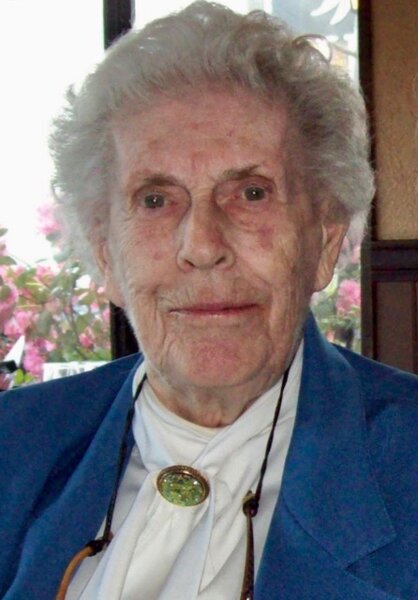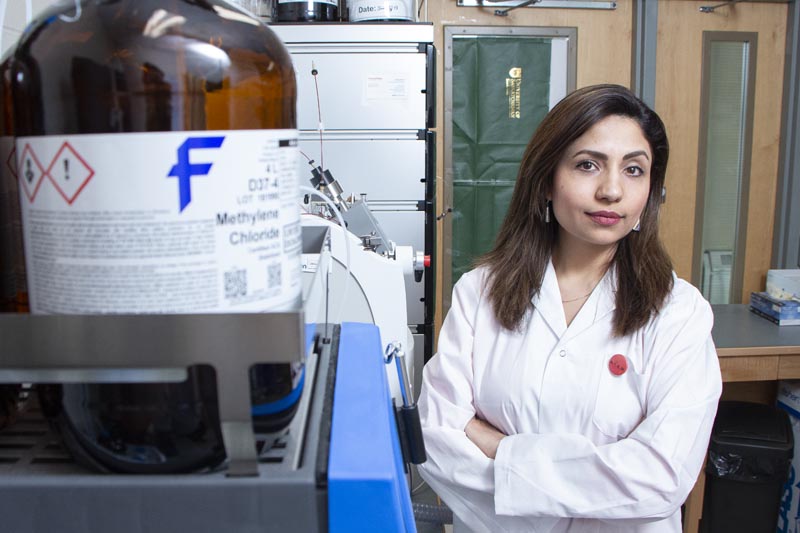
USask alumna’s legacy gift creates scholarships for female chemistry students
When Dr. Wilma Ethel Elias (PhD) was born in Calgary on April 3, 1925—a few years before the Great Depression—it was not common for women to pursue post-secondary education and careers in the sciences.
By Shannon BoklaschukYet, from the time she was 13, Dr. Elias knew she wanted to go to university—an unusual aspiration for girls her age. She loved science and was initially drawn to astronomy and geology, later discovering a passion for chemistry in high school.
In the 1940s, around the end of the Second World War, Dr. Elias headed to the University of Saskatchewan (USask) to study chemistry. She received her bachelor’s degree at USask’s College of Arts in Science in 1947, followed by her master’s degree at the college in 1950.
Dr. Elias then went on to earn her PhD at the University of British Columbia (UBC)—becoming the first woman to do so at UBC in 1956. She loved teaching, and in 1958 she became a faculty member in the Department of Chemistry at the University of Victoria, where she remained employed until her retirement in 1985.
In addition to chemistry, Dr. Elias was interested in a wide variety of topics and subjects throughout her life, such as Greek and Roman history, watercolour painting, gardening, geology, music, reading and writing. She was also an avid traveller, favouring trips to Greece and Italy.
Dr. Elias had a lifelong interest in music, studying the violin and piano as a child. At the age of 90 she returned to the piano, teaching herself using books and recordings as her guides. One of her later quests was to discover the origins of piano scores played by her father when she was a child—music retained only as sound memories, not by name.
“She was a very, very curious person, and loved learning,” said Dr. Elias’ second cousin, Shauna Fenwick. “Even in her late 80s and early 90s, she had a very broad spectrum of interests and she always wanted to learn.”
Dr. Elias passed away on May 1, 2018, at the age of 93. Through a planned gift in her will, Dr. Elias has established the Wilma E. Elias Scholarship for Women in Chemistry at USask. The bequest of $540,000 will be endowed, providing long-term support for females studying chemistry—a fitting legacy for this distinguished alumna. She also gave substantial donations to UBC and the University of Victoria to support women studying chemistry. Other donations went to her community, to support seniors, volunteers and the Victoria Symphony.
“The family is delighted that the bulk of Wilma’s assets are going to support women who study chemistry,” said Fenwick. “Always a strong advocate of women and a lover of chemistry, scholarships are exactly the best place for her money to go.”
“On behalf of the College of Arts and Science, I would like to express my sincere gratitude for the generous gift to our students from our esteemed alumna Dr. Wilma Elias,” said Dr. Peta Bonham-Smith (PhD), dean of the College of Arts and Science and a professor of biology.
“These funds will help our college continue its support and encouragement of female students in their pursuit of a science education and a future career in the sciences.”

Dr. Elaheh Khozeimeh Sarbisheh (PhD), a postdoctoral fellow in the Department of Chemistry in the College of Arts and Science, said she was “very glad” to learn about the scholarships that will result from Dr. Elias’ gift.
Khozeimeh Sarbisheh is the chair of the University of Saskatchewan-Women in Chemistry (USask-WiC) group. The goal of USask-WiC is to encourage, support and advocate for women and gender minorities, and its members seek to collaborate with undergraduate and graduate students, postdoctoral fellows, staff and faculty members at USask.
“It is very important to have these kinds of scholarships, because it shows students that a woman can be very successful in STEM fields to the extent that they can leave behind such a rich legacy,” she said.
Even today, females face barriers and biases in STEM (science, technology, engineering and mathematics), said Khozeimeh Sarbisheh; according to Statistics Canada, in 2016 women made up just 34 per cent of STEM bachelor’s degree holders and just 23 per cent of science and technology workers among Canadians aged 25 to 64.
“It is not only important, but also essential, to support women in sciences and STEM fields,” said Khozeimeh Sarbisheh. “Because if we want to be successful in different fields of science, we need diversity, we need inclusion—otherwise we will miss many aspects of science. It is not possible to achieve the diversity goal without including and supporting women in science, as for many years women suffered from the unconscious biases against them.”
Fenwick said Dr. Elias was a “fiercely independent” and “feisty” woman. Dr. Elias was very proud of being able to purchase her home without having a co-signer; having a co-signer was a common practice for women in the 1960s.
It’s likely Dr. Elias would have faced barriers as she pursued her education and career in science. Still, school was always a “really important place” for Dr. Elias, said Fenwick, so it’s fitting that her generosity will continue to support female students’ post-secondary education for years to come.
“She was an amazing woman,” Fenwick said.
Article originally published on https://artsandscience.usask.ca.

